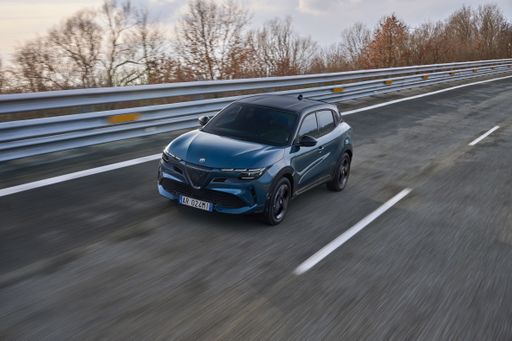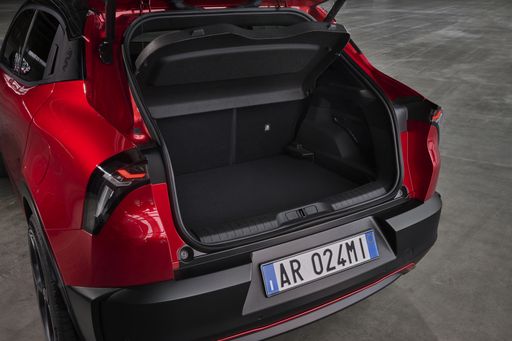Alfa Romeo Junior vs VW Transporter Transporter – Which model is better for everyday use?
Everyday use, family trips or long-distance drives – here’s where the differences show.
Discover whether Alfa Romeo Junior or VW Transporter Transporter fits your lifestyle better.
Costs and Efficiency:
Price and efficiency are often the first things buyers look at. Here it becomes clear which model has the long-term edge – whether at the pump, the plug, or in purchase price.
Alfa Romeo Junior has a significantly advantage in terms of price – it starts at 25700 £, while the VW Transporter Transporter costs 37500 £. That’s a price difference of around 11844 £.
Fuel consumption also shows a difference: Alfa Romeo Junior manages with 4.80 L and is therefore clearly more efficient than the VW Transporter Transporter with 7.10 L. The difference is about 2.30 L per 100 km.
In terms of energy consumption, the advantage goes to the Alfa Romeo Junior: with 15.10 kWh per 100 km, it’s convincingly more efficient than the VW Transporter Transporter with 21.90 kWh. That’s a difference of about 6.80 kWh.
As for range, the Alfa Romeo Junior performs a bit better – achieving up to 410 km, about 79 km more than the VW Transporter Transporter.
Engine and Performance:
Power, torque and acceleration say a lot about how a car feels on the road. This is where you see which model delivers more driving dynamics.
When it comes to engine power, the VW Transporter Transporter has a hardly perceptible edge – offering 286 HP compared to 280 HP. That’s roughly 6 HP more horsepower.
In acceleration from 0 to 100 km/h, the Alfa Romeo Junior is evident quicker – completing the sprint in 5.90 s, while the VW Transporter Transporter takes 7.40 s. That’s about 1.50 s faster.
In terms of top speed, the Alfa Romeo Junior performs evident better – reaching 206 km/h, while the VW Transporter Transporter tops out at 150 km/h. The difference is around 56 km/h.
There’s also a difference in torque: VW Transporter Transporter pulls a bit stronger with 415 Nm compared to 345 Nm. That’s about 70 Nm difference.
Space and Everyday Use:
Cabin size, boot volume and payload all play a role in everyday practicality. Here, comfort and flexibility make the difference.
Both vehicles offer seating for 5 people.
In curb weight, Alfa Romeo Junior is noticeable lighter – 1380 kg compared to 1872 kg. The difference is around 492 kg.
When it comes to payload, VW Transporter Transporter convincingly takes the win – 1259 kg compared to 420 kg. That’s a difference of about 839 kg.
Who comes out on top?
Overall, the Alfa Romeo Junior shows itself to be performs better in key areas and secures the title of DriveDuel Champion.
It convinces with the more balanced overall package and proves to be the more versatile choice for everyday use.
 @ Alfa Romeo / Stellantis Media
@ Alfa Romeo / Stellantis Media
Alfa Romeo Junior
Alfa Romeo Junior
The Alfa Romeo Junior captures the essence of Italian design with its sleek lines and compact dimensions, making it an icon of elegance and performance. With a spirited driving experience and a charming retro aesthetic, it appeals to enthusiasts and casual drivers alike. This delightful car embodies the brand's rich heritage while remaining a fun and engaging option for those seeking a unique automotive experience.
details @ Alfa Romeo / Stellantis Media
@ Alfa Romeo / Stellantis Media
 @ Alfa Romeo / Stellantis Media
@ Alfa Romeo / Stellantis Media
 @ Alfa Romeo / Stellantis Media
@ Alfa Romeo / Stellantis Media
VW Transporter Transporter
The VW Transporter, a versatile favourite among commercial vehicles, combines practicality with modern design. Its spacious interior offers ample room for both passengers and cargo, making it a reliable choice for businesses and families alike. The vehicle's strong build and advanced technology ensure a smooth and efficient driving experience in various conditions.
details
 @ Alfa Romeo / Stellantis Media
@ Alfa Romeo / Stellantis Media
|
|
|
|
|
Costs and Consumption |
|
|---|---|
|
Price
25700 - 41600 £
|
Price
37500 - 60800 £
|
|
Consumption L/100km
4.8 - 5.4 L
|
Consumption L/100km
7.1 - 8.4 L
|
|
Consumption kWh/100km
15.1 - 17.5 kWh
|
Consumption kWh/100km
21.9 - 24.4 kWh
|
|
Electric Range
344 - 410 km
|
Electric Range
56 - 331 km
|
|
Battery Capacity
0.4 - 51 kWh
|
Battery Capacity
11.8 - 63.8 kWh
|
|
co2
0 - 119 g/km
|
co2
0 - 220 g/km
|
|
Fuel tank capacity
44 - 45 L
|
Fuel tank capacity
55 L
|
Dimensions and Body |
|
|---|---|
|
Body Type
SUV
|
Body Type
Cargo Van
|
|
Seats
5
|
Seats
2 - 5
|
|
Doors
5
|
Doors
4 - 5
|
|
Curb weight
1380 - 1689 kg
|
Curb weight
1872 - 2462 kg
|
|
Trunk capacity
340 - 415 L
|
Trunk capacity
-
|
|
Length
4173 mm
|
Length
5050 - 5450 mm
|
|
Width
1781 mm
|
Width
2032 mm
|
|
Height
1505 - 1538 mm
|
Height
1966 - 1985 mm
|
|
Max trunk capacity
1205 - 1280 L
|
Max trunk capacity
-
|
|
Payload
390 - 420 kg
|
Payload
755 - 1259 kg
|
Engine and Performance |
|
|---|---|
|
Engine Type
Electric, Petrol MHEV
|
Engine Type
Diesel, Plugin Hybrid, Electric
|
|
Transmission
Automatic
|
Transmission
Manuel, Automatic
|
|
Transmission Detail
Dual-Clutch Automatic, Reduction Gearbox
|
Transmission Detail
Manual Gearbox, Automatic Gearbox
|
|
Drive Type
Front-Wheel Drive, All-Wheel Drive
|
Drive Type
Front-Wheel Drive, All-Wheel Drive, Rear-Wheel Drive
|
|
Power HP
136 - 280 HP
|
Power HP
110 - 286 HP
|
|
Acceleration 0-100km/h
5.9 - 9.1 s
|
Acceleration 0-100km/h
7.4 - 16.9 s
|
|
Max Speed
150 - 206 km/h
|
Max Speed
112 - 150 km/h
|
|
Torque
230 - 345 Nm
|
Torque
310 - 415 Nm
|
|
Number of Cylinders
3
|
Number of Cylinders
4
|
|
Power kW
100 - 207 kW
|
Power kW
81 - 210 kW
|
|
Engine capacity
1199 cm3
|
Engine capacity
1996 - 2488 cm3
|
General |
|
|---|---|
|
Model Year
2024 - 2025
|
Model Year
2025
|
|
CO2 Efficiency Class
A, C, D
|
CO2 Efficiency Class
G, A
|
|
Brand
Alfa Romeo
|
Brand
VW
|
What drive types are available for the Alfa Romeo Junior?
Available configurations include Front-Wheel Drive or All-Wheel Drive.
The prices and data displayed are estimates based on German list prices and may vary by country. This information is not legally binding.
